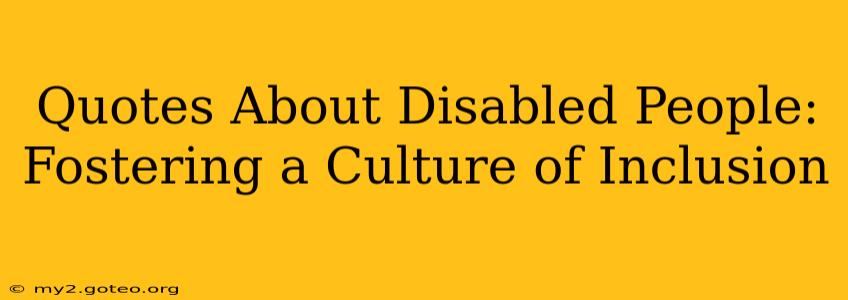The way we talk about disability profoundly impacts the lived experiences of disabled people. Negative or stigmatizing language perpetuates harmful stereotypes and reinforces societal barriers. Conversely, empowering and inclusive language fosters a culture of acceptance, understanding, and genuine inclusion. This article explores impactful quotes about disabled people, analyzing their significance and examining how we can use language to build a more equitable society. We'll also address some frequently asked questions surrounding disability and inclusivity.
What are some powerful quotes about disability that promote inclusion?
Many inspiring quotes highlight the resilience, strength, and contributions of disabled people. Here are a few examples:
-
"Disability is not an inability; it is a different ability." This quote succinctly captures the essence of disability as a form of human diversity, not a deficit. It reframes the narrative away from limitations and towards unique strengths and perspectives.
-
"The measure of a society is how it treats its most vulnerable members." This quote, though not specifically about disability, speaks to the societal responsibility of creating an inclusive environment for all, including those with disabilities. It emphasizes the ethical imperative of creating equitable access and opportunity.
-
"We are all different. We all have different abilities. It is important to accept each other for who we are, regardless of our disabilities." This emphasizes the shared humanity underlying diversity and calls for acceptance and respect for individual differences.
What are some common misconceptions about disability?
Addressing misconceptions is crucial for fostering inclusion. Some common misconceptions include:
-
Disability is solely a medical problem: This neglects the social model of disability, which emphasizes societal barriers as major contributors to disability. Disability is a complex interaction between individual characteristics and environmental factors.
-
Disabled people are dependent and need to be cared for: This reinforces a paternalistic approach and ignores the agency and independence of many disabled individuals. The focus should be on supporting self-determination and providing accessible resources.
-
Disability is something to be cured or fixed: This ignores the value of diversity and the contributions of disabled people. The focus should be on creating a society that accommodates diverse needs and abilities, not on attempting to erase differences.
How can we use language to promote inclusion of disabled people?
Using inclusive language is paramount. Instead of terms like "handicapped" or "afflicted," opt for person-first language (e.g., "person with a disability") or identity-first language (e.g., "disabled person"), depending on individual preference. Focus on abilities and contributions rather than limitations. Avoid language that infantilizes or patronizes.
Why is it important to use inclusive language when discussing disability?
Inclusive language is not simply about political correctness; it is about respect and recognition. Using appropriate language reflects a genuine commitment to valuing disabled people as full members of society. It contributes to creating a more accepting and equitable world. Excluding or misrepresenting individuals through language directly impacts their self-esteem and can contribute to social isolation and discrimination.
What resources are available for learning more about inclusive language and disability?
Numerous organizations dedicate themselves to promoting disability awareness and inclusive language. These organizations often offer resources, training, and guidelines for using appropriate language. A simple online search can uncover a wealth of valuable information.
How can I be a better ally to disabled people?
Allyship requires ongoing education, self-reflection, and a commitment to action. Listen to the experiences of disabled people, advocate for inclusive policies, and challenge discriminatory language and behaviors. Be an active participant in creating a more accessible and equitable world.
Conclusion:
The power of language in shaping perceptions of disability cannot be overstated. By embracing inclusive language, challenging misconceptions, and actively promoting a culture of understanding, we can create a society that truly values the contributions and unique perspectives of all its members, regardless of ability. This requires continued effort and a genuine commitment to equity and inclusion.

